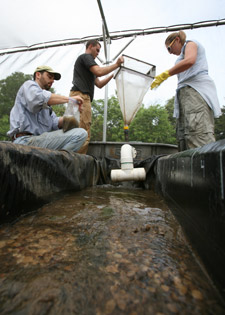Rounding up Baylor research efforts
 While it will still be quite some time before the Baylor Research and Innovation Collaborative (BRIC) is up and running, that doesn’t mean the university is sitting around just waiting for that day to begin research efforts. To the contrary — there are more research projects going on than we can keep up with. Here are just a few recently announced studies:
While it will still be quite some time before the Baylor Research and Innovation Collaborative (BRIC) is up and running, that doesn’t mean the university is sitting around just waiting for that day to begin research efforts. To the contrary — there are more research projects going on than we can keep up with. Here are just a few recently announced studies:
- Chemistry and biochemistry professors Dr. Kevin Pinney and Dr. Mary Lynn Trawick received a $200,000 grant from the Cancer Prevention and Research Institute of Texas to study a series of compounds that potential anticancer compounds that have recently emerged from Baylor’s on-going cancer research program.
- Using a new search method he adapted for use on the seafloor, geology professor Dr. John Dunbar and his research team found a potentially massive new source of hydrocarbon energy called methane hydrate, a frozen form of natural gas, in a portion of the Gulf of Mexico. The U.S. Department of Energy has awarded Dunbar more than $115,000 to continue researching the site.
- A Baylor study led by biology professor Dr. Ryan King (pictured) and funded by the Environmental Protection Agency found that concentrations of phosphorus above 20 parts per billion (ppb) are linked to declines in water quality and aquatic plant and animal life, demonstrating with certainty that too much phosphorus does indeed cause problems for many Texas streams.
Sic ’em, Baylor researchers!

